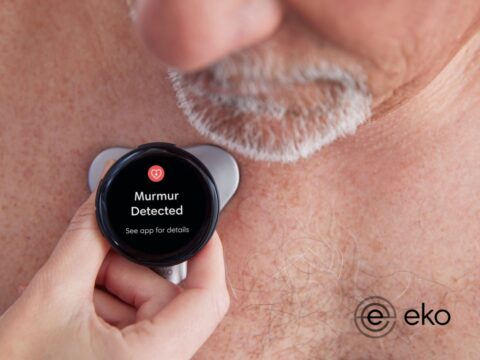
In 1816, French physician René Laennec invented an instrument that allowed doctors to listen to human hearts and lungs. That device — a stethoscope — eventually evolved from a simple wooden tube to a lightweight two-earpiece version most doctors today wear on their necks.
Eko Health, a startup founded in 2013, is bringing this ubiquitous medical tool into the digital age by enhancing it with AI. Over the past decade, Eko has sold its stethoscope to more than 500,000 physicians and healthcare providers. Because they’ve been used on millions of patients, the company has amassed a large dataset of chest sounds and electrocardiogram (ECG) information, which Eko used to develop various algorithms for detecting heart conditions.
“The stethoscope exam is incredibly inconsistent and inaccurate. Patients get late diagnoses, or they get misdiagnosed,” said Connor Landgraf, Eko Health’s CEO and founder. “We want to bring precision using AI that could enable patients to get earlier, more competent diagnoses.”
Landgraf explained that with a traditional stethoscope, a physician can’t always hear the subtle differences between health and disease. “With our AI, they can combine [heart sounds] with cardiac rhythm assessment and then have the AI interpret that. You almost have the skills of a cardiologist in the pocket of a primary care physician or even a nurse practitioner or a frontline health care professional,” he said.
In April, the Eko stethoscope received FDA clearance for using its AI to help detect the first signs of heart failure during a routine medical exam. That’s the company’s third algorithm to receive FDA approval. Eko’s AI has also recently been cleared to detect heart murmurs, which could be a sign of abnormal heart valves. (A Massachusetts General Hospital study found that Eko’s AI identified more than two times as many patients with heart disease compared to primary care doctors.)
Eko’s clinical milestones have helped it raise a $41 million Series D round with participation by ARTIS Ventures, Highland Capital Partners, NTTVC and Questa Capital. The latest capital infusion brings the company’s total funding to $165 million.
The fresh financing will go toward training AI algorithms to detect pulmonary conditions such as asthma and pneumonia, as well as for selling its device and companion software to doctors outside of the U.S.
“Of all the things that I invested in, Eko may be one of the most practical because you can easily use it to change outcomes,” said Vas Bailey, partner at ARTIS Ventures. Bailey lost his father to heart disease on his 11th birthday. “We can find more cases of cardiac abnormalities when you’re going to go see a doctor for a routine workup. Maybe as a part of your screening, we can help save your life. Maybe it could have helped save my dad’s life.”
While no other company integrated AI into a stethoscope, other startups that use AI to detect heart conditions include Ultromics and CardioSignal.
